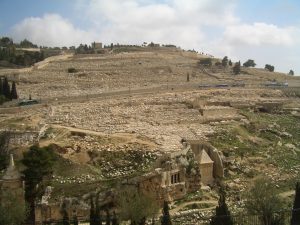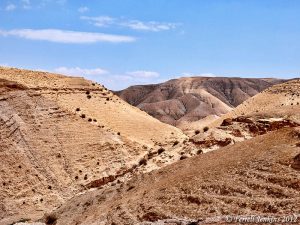In Jesus’ day the people understood the ways that vines grow and they understood waiting for the fruit. Just as the vine waits for the fruit, we must learn to wait for our prayers to be answered. we cannot say, “I want this according to my time schedule, God.” Our “jump through the hoop when I whistle” prayers are not necessarily going to be answered in the way we want them to be. Learning to wait is important.
In Israel, 75% of the year’s rainfall occurs in January through March. The grapes come out in July and August after four months of no rain, of dryness. If you had asked anyone in Jesus’ day what was remarkable about vineyards, they would have told you that when the rest of the country is all brown and dried up from five months of no rainfall, the vineyards are green and the grapes appear. Just when the water cisterns are drying out, the grapes are abundant. The grapevine is truly a miracle plant. How does it happen? It happens because the vinedresser has done everything in the rainy season to make sure the vines will be okay in the dry season. The vinedresser has maintained the wall and turned the soil to loosen it so moisture can seep in.
The rocky land in Judah is better for growing grapes than would be soil not mixed with rocks. Judah gets the equivalent of between 11-12 inches of rainfall each year. In the five dry months there is no rain (rain would be the obvious blessing). But the silent, unobservable blessing of dewfall comes in the night. When the sun comes up the dew quickly evaporates. If the ground were not mixed with rocks, the heat from the sun would keep the surface soil dry, causing moisture from a deeper level to rise to the top. But in rocky soil, the dew trickles down the side of the rocks. Then, when the sun comes up, the rocks provide the shade that allows the dew to get into the soil. After five months of no rain, no obvious blessing, it is the rocky soil that permits the dewfall to keep poisture in the ground.
Dew is the symbol of the silent, unobservable blessing of God. He has made ways for us to receive it by keeping the soil in our lives loose and by protecting us from being trampled.
In Judges 6 and 7 we have the story of Gideon. Gideon, raised in the tribe of Zebulun in a little village called Ophrah, is living in a difficult time. The Midianites and the Amalekites who have invaded and ravaged this land do not allow the Israelites to plant their fields or to raise their cattle.
If we look at the early chapters of his life, we find many instances when the word of the Lord came to Gideon. Now, a very important thing happens. Gideon feels that the Lord wants to use him to unite the Israelites against the invading Midianites. Just when he gets everybody assembled on top of Mount Gilboa in Gilead, there is no rain, spiritually; there is only dew. There is no word of the Lord. God seems silent when he needs God most. Gideon asks, “God, do you want me to go into battle or not? I have 32,000 men up here from all over Israel.”
Then he gets a great idea. He tells god, “I’ll tell you what, Lord you are not answering my like you did in my youth, so let me put out a sheepskin. I am going to hang it up tonight and see what happens when I wake up tomorrow. If the fleece is wet and the ground is dry when I wake up, I will know that you want me to proceed into battle.” Gideon is very generous – he gives God eight hours to act!
 Gideon awakens the next morning and, sure enough, the fleece is wet and the ground is dry. But when you put God to a test like that you always start to wonder if it was coincidence. The next night Gideon prays again, but he is feeling cautious about doing this a second time. He prays, “Now God, please be patient with me; I just want to do this one more time. I promise, only one more time. But tonight I want the fleece dry and the ground wet.” And he gives God another eight hours to act.
Gideon awakens the next morning and, sure enough, the fleece is wet and the ground is dry. But when you put God to a test like that you always start to wonder if it was coincidence. The next night Gideon prays again, but he is feeling cautious about doing this a second time. He prays, “Now God, please be patient with me; I just want to do this one more time. I promise, only one more time. But tonight I want the fleece dry and the ground wet.” And he gives God another eight hours to act.
The next morning the fleece is dry and the ground is wet. These results would happen if on one dewy night there was no wind, and on the next dewy night there was wind. He wakes up the first morning and the fleece is wet and the ground is dry; there was no wind coming across the mountain that night. He wakes up the second morning and the fleece is dry and the ground is wet; the wind had blown that night, evaporating the dew from the hanging fleece.
We are tempted to put God to the test when God seems silent, when we have to wait. when there is just dewfall (silent, unobservable blessing) and no rainfall (obvious blessing), we are tempted to do what Gideon did and hang out the fleece. The writer of the Book of Judges doesn’t want this text used to show that it is all right to say to God, “Let me receive a letter from Uncle Harry as a sign if you want me to do so and so.” Gideon ultimately went into battle with 300 men. How much confidence do you think that fleece gave him when he was afraid to go into battle with 32,000 men and he ends up with 300 men?
In the wilderness, Jesus was tempted to put god to the test. Quoting Deuteronomy, he replied, “Thou shall not put the Lord your God to a test.” You and I are tempted to put god to a test when we are on a time schedule and our prayers don’t seem to be answered. Like Gideon, we say, “Okay God, what’s the score?” It is human nature to ask for a sign. Although some people have had amazing results from this kind of prayer, which contributed to their making a major decision in life, the Bible tells us we should not normally do this. In our youth, when we are yet young Christians, it often appears that the Lord does jump through our hoops when we whistle. When we are young, many times the Lord does respond to our immature method of hanging out fleeces.
But there are five dangers in hanging out a fleece, of saying, “God, you are not answering my prayer. I don’t know what you want me to do. If you make this happen, or make that not happen, I will know in which direction you want me to go.” We should be aware of these five cautions when we are tempted to force God to send an answer to our prayers through some unusual circumstance or sign.
1. A fleece reduces faith to sight. We wake up the next morning, open our eyes, and see a wet or dry fleece. We are depending on our outward sight, but the realm of God’s spirit is within. It is insight, not outward or visual sight. When we are looking for a sign, we may not focus on God, who is within us.
2. A fleece inhibits the growth of common sense. There are some Christians who always make their decisions based on some unusual event. They reason, “Since this unusual thing happened, it means that I should go on and do it.” Or they say, “Well the door opened for me, so I went through it.” where is the discernment? where is the art of learning to evaluate, of using common sense? Must thou goest through every open door thou seest?
3. A fleece inhibits the growth of courage. We have trouble waiting, so we put out a fleece of circumstances. sometimes we get this awesome sense of the peace of God. The peace of God is a terrible thing because it means you feel right about something but you know it certainly is not going to be easy. That is how we get courage. If we make all of our decisions based on apparent circumstances how do we grow in courage?
4. A fleece limits possibilities. Judging the answer to a prayer just by circumstances that happen limits God. Gideon was going to wake up the next morning with a wet or dry fleece. He was very generous – not only did he give god eight hours to act, but he also gave him two choices: a) he would go into battle, or b) he would not go into battle. When we say, “Lord, answer my prayer this way or that way,” we are putting God in a box. What if God’s answer to Gideon had been “none of the above?”
5. A fleece does not allow “wait” to be an answer. Like Gideon, we want our answer by tomorrow. what if the Lord wanted to tell Gideon, “Yes, I would like for you to lead the Israelites in battle against the Midianites, but I want you to do it six months from now?” A fleece does not permit a “yes, but later” answer. We put out a fleece because we are tired of waiting, we want a sign. We are tempted to ask God to act through signs and circumstances because we have trouble with waiting. We can’t accept “wait” as an answer. Many prayers that seem unanswered may have a “wait, not yet” answer. For most of us Americans living in the 21st century, wait is a terrible desert between where we are and where we want to be. Who wants to be in a dry desert? There are times in our lives when what seems to be a “no” is probably the Lord saying, “Please allow this to be a season of waiting. I hear you and I care for you. I am answering you ‘wait’.” We can learn to be creative in our waiting, hoping that the rain will come into our lives soon.
We tend to load our fleeces and then we tilt them in the direction we want. When there is something we hope the Lord doesn’t want us to do, we ask for an unlikely sigh, such as a letter from Uncle Joe, with whom we have not corresponded in ten years. If there is something we hope the Lord wants us to do, we tell the Lord that if he makes us hungry for dessert today we will know that he wants us to do it.
 If any people learned about waiting, it was the ancient Israelites. The Messiah would come from the east over the Mount of Olives (shown in this picture) to Jerusalem. In Isaiah 40, the wilderness of Judea is the desert of expectation. The people are told to “wait for the Lord as you look beyond the city. Prepare ye the way for the Lord.” Isaiah says, “Comfort ye, comfort ye my people. Speak ye comfortingly to Jerusalem.” They are waiting for the one who will deliver them from their desert.
If any people learned about waiting, it was the ancient Israelites. The Messiah would come from the east over the Mount of Olives (shown in this picture) to Jerusalem. In Isaiah 40, the wilderness of Judea is the desert of expectation. The people are told to “wait for the Lord as you look beyond the city. Prepare ye the way for the Lord.” Isaiah says, “Comfort ye, comfort ye my people. Speak ye comfortingly to Jerusalem.” They are waiting for the one who will deliver them from their desert.
Isaiah tells the people, “Exalt the valleys; make the mountains low; make a straightway through the desert; welcome the Messiah to come.” The rugged desert east of Jerusalem was the desert of their waiting because of Isaiah.
 Let’s not let “wait” be that terrible desert between where we are and where we want to be. Let’s learn to actively and creatively wait. In Luke 15 we have the famous lost and found chapter. One sheep out of 100 is lost and the shepherd leaves the 99 sheep to look for the lost sheep. There is the parable of the one coin out of ten being lost. The woman lights a lamp, sweeps the house, and looks for the lost coin until she finds it. Then we have the story of the little Jewish boy who ran away from home and wished his parents were dead. When he returns, his father who has been waiting all this time welcomes him.
Let’s not let “wait” be that terrible desert between where we are and where we want to be. Let’s learn to actively and creatively wait. In Luke 15 we have the famous lost and found chapter. One sheep out of 100 is lost and the shepherd leaves the 99 sheep to look for the lost sheep. There is the parable of the one coin out of ten being lost. The woman lights a lamp, sweeps the house, and looks for the lost coin until she finds it. Then we have the story of the little Jewish boy who ran away from home and wished his parents were dead. When he returns, his father who has been waiting all this time welcomes him.
The point of these parables is to wait with hope. Perhaps the prayer has not been answered because it is not yet the right season in the heart of the one who is praying. God will never give up trying to make that right season to come. You and I should not give up praying for the correct season to come.
We can also learn, as we wait in the desert, to depend on God. You are not going to live long on your own strength in a place like that. The very nature of the desert teaches us a lot.
In the wilderness, Jesus was tempted to put god to the test. Quoting Deuteronomy, he replied, “Thou shall not put the Lord your God to a test.” You and I are tempted to put god to a test when we are on a time schedule and our prayers don’t seem to be answered. Like Gideon, we say, “Okay God, what’s the score?” It is human nature to ask for a sign. Although some people have had amazing results from this kind of prayer, which contributed to their making a major decision in life, the Bible tells us we should not normally do this. In our youth, when we are yet young Christians, it often appears that the Lord does jump through our hoops when we whistle. When we are young, many times the Lord does respond to our immature method of hanging out fleeces.
